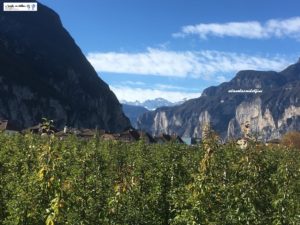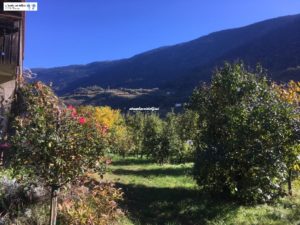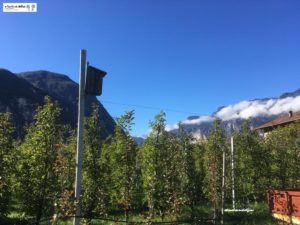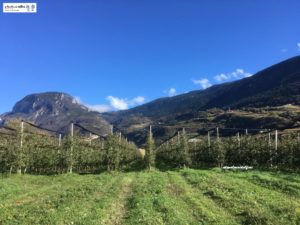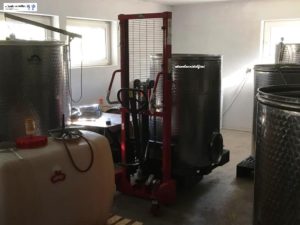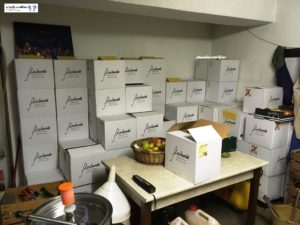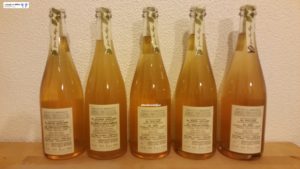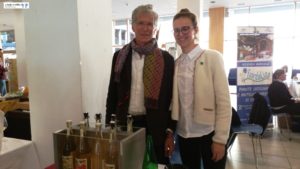I Sidri “Floribunda” cosa sono? Franz insieme a moglie e figlia coltivano mele e quando lo abbiamo conosciuto, abbiamo immaginato che svolgesse chissà quale altra attività rilassante. Ci siamo avvicinati incuriositi, attirati dai colori e dall’eleganza delle bottiglie, oltre dalla luminosa personalità di Franz e figlia, due espressioni temporali della stessa umanità.
Tutto ciò per dire che l’esercizio dell’attività di agricoltore e produttore di Sidro, mi dipinge Franz come “un interprete rock dallo stile green peace” delle fermentazioni.
In effetti, pur essendo rigoroso nell’attività agronomica, per preservare l’ambiente da regalare migliorato alla discendenza ed all’utilizzo di lieviti e tecniche antiche esperienziali, non esita ad utilizzare anche lieviti selezionati per ampliare il bouquet emozionale delle sue 5 etichette.
Franz infatti non ricerca la perfezione, ma l’incontro pacifico ed emozionale fra la madre terra con i suoi frutti fermentati e la piacevolezza degustativa del consapevole avventore. Obbligatorio riconoscere la fresca piacevolezza e la facilità di beva di queste etichette che hanno una insita, naturale, colorata, bellezza, probabilmente autobiografica di Franz e famiglia.
The “Floribunda” Sidriers what are they? Franz and his wife and daughter grow apples and when we met him, we imagined that he did some kind of relaxing activity. We approached curious, attracted by the colors and elegance of the bottles, in addition to the luminous personality of Franz and daughter, two temporal expressions of the same humanity.
All this to say that the exercise of the activity of farmer and cider producer, Franz paints me as “a rock interpreter with a green peace style” of fermentation.
In fact, despite being rigorous in agronomic activity, to preserve the environment to give improved descent and the use of yeasts and old experiential techniques, he does not hesitate to also use selected yeasts to widen the emotional bouquet of his 5 labels.
Franz in fact does not seek perfection, but the peaceful and emotional encounter between the mother earth with its fermented fruits and the tasting pleasure of the conscious customer. It is mandatory to recognize the fresh pleasantness and ease of drinking of these labels that have an inherent, natural, colorful, beauty, probably autobiographical by Franz and family.
Piccola azienda composta da poco più di un ettaro, biologica dal 1994, estesa anche ai sidri, ubicata nel fondo valle su terreni di medio impasto con elevato contenuto in calcare e materia organica.
I sidri sono prodotti esclusivamente con le proprie mele, raccolte a mano dalle piante, mai da terra. Anche i fiori di sambuco ed una parte delle mele cotogne sono di produzione, mentre il resto delle cotogne e lo zenzero vengono forniti da altri produttori bio della provincia di Bolzano.
Le mele vengono lavate, macinate e pressate. Dopo una decantazione il succo chiaro viene portato a fermentazione, con l´inoculo di mosto entrato in fermentazione spontaneamente e di lieviti selezionati.
Un inizio rapido della prima fermentazione sottolinea la caratteristica freschezza del sidro prodotto. La fermentazione in ambiente fresco agevola i profumi. Durante la fermentazione vengono aggiunte le mele cotogne (nel caso del sidro alla cotogna) o i fiori di sambuco (sidro al sambuco) o lo zenzero (sidro allo zenzero).
Small company composed of just over one hectare, organic since 1994, also extended to ciders, located in the valley bottom on medium-textured soils with high limestone and organic matter content.
Ciders are produced exclusively with their own apples, hand-picked from plants, never from the ground. Elder flowers and a part of quince are also produced, while the rest of the quinces and ginger are supplied by other organic producers in the province of Bolzano.
The apples are washed, ground and pressed. After decantation, the light juice is fermented, with the inoculation of spontaneously fermented must and selected yeasts.
A rapid start to the first fermentation underlines the characteristic freshness of the cider produced. Fermentation in a cool environment facilitates perfumes. During fermentation, quinces (in the case of quince cider) or elderflower (cider with sambuco) or ginger (cider with ginger) are added.
In Italia non vi é tradizione di usare mele specifiche per il sidro come in Francia, Inghilterra o nel nord della Spagna. Si usano invece mele da tavola di diverse varietá. Franz ha fatto molte prove per verificare se le varietá di mele coltivate in azienda fossero adatte per la produzione di sidro: mele dolci e spiccatamente acide. Da questo risulta un sidro profumato e fresco e di moderato contenuto alcolico.
Franz si cimenta in diverse tecniche di vinificazione e nel 2018 ha prodotto un sidro che ha fatto sia la fermentazione alcolica che quella malolattica in barrique partendo da mele delle varietá “Topaz” e Pilot”.
Inoltre un sidro monovarietale “Gold Rush”, dove il 70% é stato fermentato in botti inox, il 20% in barrique ed il 10% era il risultato della fermentazione delle mele intere macinate.
In Italy there is no tradition of using specific cider apples like in France, England or northern Spain. Instead, table apples of different varieties are used. Franz did a lot of tests to see if the varieties of apples grown on the farm were suitable for the production of cider: sweet and distinctly acid apples. This results in a fragrant and fresh cider with a moderate alcohol content.
Franz engages in various winemaking techniques and in 2018 produced a cider that made both alcoholic and malolactic fermentation in barrique starting from apples of the “Topaz” and Pilot varieties.
In addition, a single-variety “Gold Rush” cider, where 70% was fermented in stainless steel barrels, 20% in barriques and 10% was the result of the fermentation of whole ground apples.
Dalle prime fermentazioni risultano dei sidri fermi, i quali vengono destinati ad una spumantizzazione secondo il metodo classico, aggiungendo succo delle stesse mele al posto dello zucchero. Basse temperature di fermentazione in bottiglia con affinamento lento comportano un perlage fine e persistente ed un minor sviluppo dei residui di fermentazione.
Tutto questo, ci dice Franz “per noi é importante, perché non facciamo la sboccatura. Fermiamo la fermentazione inattivando i lieviti con un breve innalzamento della tempertura intorno ai 50° C. Cosí otteniamo un sidro naturalemente torbido con un residuo dolce appena percepibile”. Un ulteriore vantaggio di questo metodo é di non dover aggiungere solfiti, perché il sidro “sur lie” si conserva da sé.
From the first fermentations are firm ciders, which are destined to a sparkling process according to the classic method, adding juice from the same apples instead of sugar. Low fermentation temperatures in the bottle with slow refinement involve a fine and persistent perlage and a lesser development of fermentation residues.
All of this, Franz tells us, “is important to us, because we do not disgorge. We stop fermentation by inactivating the yeasts with a brief rise in temperature of around 50 ° C. In this way we obtain a naturally turbid cider with a barely perceptible sweet residue “. A further advantage of this method is that it does not have to add sulphites, because the “sur lie” cider conserves itself.
Degustazione:
– Sidro Mela Barricato alcol 6,7% – 1000 bt – 9,5€ bt
Complessità e carattere , struttura, caratteristiche che ne agevolano l’abbinamento a piatti di verdure o selvaggina, carni bianche e bollito, formaggi di elezione.
– Sidro di Mela 6,7% – 2000 bt – 9€ bt
Morbido, delicato, elegante, il nostro preferito.
– Sidro di Mela al Ginger 7,3% – 2000 bt – 9,5€ bt
Brioso, ampio, pungente, molto adatto per aperitivi, anche rinforzati, tra i preferiti.
– Sidro di Mela al Sambuco 6,0% – 2000 bt – 9,5€ bt
Acidità importante, una etichetta giovane, moderna, tra i preferiti.
– Sidro di Mela Cotogna 6% – 2000 bt – 10€ bt
Frutta a polpa matura, evoluta, ideale con pasticceria secca, dolci al cucchiaio di media struttura, meditazione da servire fresco. Il bouquet più ampio di casa Floribunda .
Tasting:
– Apple Cider Barricato alcohol 6.7% – 1000 bt – € 9.5 bt
Complexity and character, structure, characteristics that facilitate the combination with vegetable or game dishes, white and boiled meats, and cheeses of choice.
– Apple cider 6.7% – 2000 bt – € 9 bt
Soft, delicate, elegant, our favorite.
– Ginger Apple Cider 7.3% – 2000 bt – € 9.5 bt
Lively, ample, pungent, very suitable for aperitifs, even reinforced, among the favorites.
– Elderberry Cider 6.0% – 2000 bt – € 9.5 bt
Important acidity, a young, modern label, one of the favorites.
– Quince Apple Cider 6% – 2000 bt – € 10 bt
Fruit with mature pulp, evolved, ideal with dry pastry, medium structure spoon desserts, meditation to be served fresh. The widest bouquet of the Floribunda house.
9000 bottiglie sono la produzione di Franz, ma anche l’espressione di una cultura delle fermentazioni, della cantina intesa come cura ed affinamento di pratiche centenarie, che rivivono nella moderna convivialità.
Esprimo la nostra predilezione per il Sidro di Mele, al Sambuco e al Ginger. Eleganti, ben equilibrati, magari con la persistenza del Ginger al terzo calice consecutivo. Terzo giro di calice che queste etichette raggiungono facilmente. Mela barricata e Mela Cotogna, sono il versante gastronomico e di meditazione possibile di questo Sidro. Incontrare Franz e scrivere della sua esperienza che fermenta, ci ha gratificato, molto.
9.000 bottles are the production of Franz, but also the expression of a culture of fermentation, of the cellar understood as care and refinement of centuries-old practices, which are revived in modern conviviality.
I express our preference for Apple Cider, Elderberry and Ginger. Elegant, well balanced, perhaps with the persistence of Ginger on the third consecutive chalice. Third round of glass that these labels easily reach. Apple barricade and Quince Apple, are the possible gastronomic and meditation side of this Cider. Meeting Franz and writing about his fermenting experience, he gratified us, very much.
Atavolacoidelfini inbrododimele 🙂


